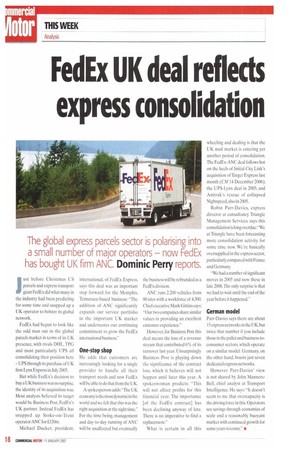FedEx UK deal reflects express consolidation
Page 18

If you've noticed an error in this article please click here to report it so we can fix it.
The global express parcels sector is polarising into a small number of major operators — now FedEx has bought UK firm ANC. Dominic Perry reports.
Just before Christmas US parcels and express transport giant FedEx did what many in the industry had been predicting for some time and snapped up a UK operator to bolster its global network.
FedEx had begun to look like the odd man out in the global parcels market in terms of its UK presence, with rivals DHL. TPG and most particularly UPS all consolidating their position here — UPS through its purchase of UK firm Lynx Express in July 2005.
But while FedEx's decision to buy a UK business was no surprise, the identity of its acquisition was. Most analysts believed its target would be Business Post, FedEx's UK partner. Instead FedEx has snapped up Stoke-on-Trent operator ANC for il 20m.
Michael Ducker, president, international, of FedEx Express, says this deal was an important step forward for the Memphis. Tennessee-based business: "The addition of ANC significantly expands our service portfolio in the important UK market and underscores our continuing commitment to grow the FedEx international business."
One-stop shop He adds that customers are increasingly looking for a single provider to handle all their transport needs and now FedEx will he able to do that from the UK, A spokesperson adds: "The UK economy is the most dynamic in the world and we felt that this was the right acquisition at the right time." For the time being, management and day-to-day running of ANC will be unaffected but eventually the business will be rebranded as a FedEx division.
ANC runs 2,200 vehicles from 80 sites with a workforce of 4,500. Chief executive Mark Gittins says: "Our two companies share similar values in providing an excellent customer experience."
However, for Business Post this deal means the loss of a revenue stream that contributed 6% of its turnover last year. Unsurpisingly Business Post is playing down the significance of the contract loss, which it believes will not happen until later this year. A spokeswoman predicts: "This will not affect profits for this financial year. The importance [of the FedEx contract] has been declining anyway of late. There is no imperative to find a replacement."
What is certain in all this wheeling and dealing is that the UK mail market is entering yet another period of consolidation. The FedEx-ANC deal follows hot on the heels of Initial City Link's acquisition of Target Express last month (CM 14 December 2006); the UPS-Lynx deal in 2005; and Amtrak's rescue of collapsed Nightspeed, also in 2005.
Robin Parr-Davies, express director at consultancy Triangle Management Services, says this consolidation is long overdue: "We at Triangle have been forecasting more consolidation activity for some time now. We're basically oversupplied in the express sector, particularly compared with France and Germany.
"We had a number of significant moves in 2005 and now these in late 2006. The only surprise is that we had to wait until the end of the year before it happened."
German model Parr-Davies says there are about 15 express networks in the UK, but twice that number if you include those in the pallet and business-toconsumer sectors, which operate on a similar model. Germany, on the other hand, boasts just seven dedicated express networks.
However Parr-Davies' view is not shared by John MannersBell, chief analyst at Transport Intelligence. He says: "It doesn't seem to me that overcapacity is the driving force in this. Operators see savings through economies of scale and a reasonably buoyant market with continued growth for some years to come." to










































































































































































